
Are you looking to enhance your website’s visibility and attract more organic traffic? Search Engine Optimization (SEO) is the key to achieving those goals. Search engine optimization (SEO) is an essential aspect of digital marketing that can help bloggers and website owners improve their online presence and attract more visitors.
Here you will learn SEO and optimize your website for search engines like Google, Bing, and Yahoo, you can increase your website’s visibility and rank higher in search engine results pages (SERPs). SEO involves various strategies, including keyword research, on-page optimization, and link building, that help search engines understand your website’s content and relevance to users’ search queries. By learning the basics of Search engine optimization, you can create content that is both user-friendly and search-engine friendly, which can ultimately drive more organic traffic to your website.
In this article, we will delve into the world of SEO, providing you with valuable insights, practical tips, and effective strategies to boost your website’s rankings. Whether you’re a business owner, marketer, or website developer, mastering SEO is essential for achieving online success.
Introduction to SEO
SEO, which stands for Search Engine Optimization, is a practice that focuses on optimizing your website to improve its visibility in search engine results pages (SERPs). The primary goal of SEO is to increase organic (non-paid) traffic to your website by ensuring that it appears prominently in relevant search queries.
Search engines like Google, Bing, and Yahoo use complex algorithms to determine the ranking of websites in their search results. These algorithms consider various factors to evaluate the relevance and quality of a website. By understanding how search engines work and implementing SEO strategies, you can improve your website’s chances of ranking higher in search results.
SEO encompasses a wide range of techniques and strategies. This includes keyword research, on-page optimization, technical optimizations, link building, and user experience enhancements. By combining these elements, you can optimize your website to meet search engine criteria and attract more visitors.
Why is SEO Important?
SEO is essential for several reasons:
a. Increased Visibility:
When your website ranks higher in search results, it becomes more visible to potential visitors who are actively searching for products, services, or information related to your industry. Higher visibility leads to increased organic traffic.
b. Targeted Traffic:
SEO helps you attract targeted traffic to your website. By optimizing your website for specific keywords and phrases, you can ensure that the visitors who find your website through search engines are genuinely interested in what you have to offer.
c. Brand Exposure:
A higher search engine ranking enhances your brand’s visibility and exposure. When users repeatedly see your website in search results, it builds trust and credibility, establishing your brand as an authoritative source in your industry.
d. Competitive Advantage:
SEO allows you to outrank your competitors and gain a competitive edge. By implementing effective SEO strategies, you can improve your website’s visibility and attract more visitors than your competitors, potentially leading to higher conversions and business growth.
Understanding Search Engines
Search engines employ complex algorithms to analyze and rank websites. While each search engine has its specific algorithm, they generally consider similar factors when determining the relevance and quality of a website. Here are some key factors:
a. Keywords:
Search engines analyze the content of web pages to identify relevant keywords. Optimizing your website with strategic keywords helps search engines understand the context and relevance of your content.
b. Website Structure:
A well-structured website with clear navigation and organized content is easier for search engines to crawl and index. This includes having a logical hierarchy, clear URLs, and proper internal linking.
c. User Experience:
Search engines aim to provide the best possible experience for their users. They consider factors like page load speed, mobile-friendliness, and ease of navigation. Optimizing your website for a seamless user experience enhances its chances of ranking higher.
d. Backlinks:
Backlinks, also known as incoming links, are links from other websites that point to your site. Search engines view backlinks as a vote of confidence and authority. Quality backlinks from reputable websites can positively impact your website’s ranking.
Understanding these factors and implementing SEO strategies that align with search engine guidelines can improve your website’s visibility and attract organic traffic. By consistently monitoring and optimizing your website, you can maintain a strong online presence and increase your chances of ranking higher in search results.
On-Page Optimization Techniques
On-page optimization techniques focus on optimizing various elements within your website to improve its visibility in search engine results. By implementing these techniques, you can enhance your website’s relevance and provide a better user experience.
Here are some essential on-page optimization techniques:
I. Title Tags and Meta Descriptions:
Title tags and meta descriptions are HTML elements that appear in search engine results. They provide concise summaries of your web page’s content and should be optimized with relevant keywords. Title tags should accurately describe the page’s topic, be compelling, and adhere to character limits set by search engines. Meta descriptions should provide a brief overview of the page’s content, enticing users to click through to your website.
II. URL Structure:
Optimize your website’s URLs to be descriptive, user-friendly, and contain relevant keywords. A well-structured URL helps search engines and users understand the content of the page. Short, meaningful URLs are more memorable and are more likely to be clicked on and shared.
III. Heading Tags:
Use heading tags (H1, H2, H3, etc.) to structure your content and highlight important sections. Heading tags provide a hierarchical structure that helps search engines understand the organization of your page’s content. The H1 tag represents the main heading of the page, followed by subheadings in H2, H3, and so on.
IV. Keyword Research and Optimization:
Thorough keyword research is crucial for identifying the terms and phrases users search for. Incorporate these keywords naturally into your content, including headings, paragraphs, and image alt tags. However, avoid keyword stuffing, as it can negatively impact your website’s rankings.
V. Content Creation and Optimization:
Create high-quality, engaging, and informative content that adds value to your target audience. Optimize your content by incorporating relevant keywords naturally. Proper formatting, such as using bullet points, subheadings, and numbered lists, can improve readability and user experience. Additionally, internal linking to other relevant pages on your website helps search engines understand the connections between your content and improves navigation for users.
VI. Image Optimization:
Optimize your images by using descriptive file names and alt tags. Descriptive file names help search engines understand the context of the image, while alt tags provide alternative text that describes the image’s content. Compressing image sizes without compromising quality improves page loading speed, which is an important factor for both SEO and user experience.
VIII. Internal and External Linking:
Internal linking refers to connecting various pages within your website through hyperlinks. This improves user navigation and helps search engines crawl and index your website more effectively. External linking involves linking to authoritative sources and relevant websites. It adds credibility to your content and provides additional value to your audience.
IX. Mobile Optimization:
Given the increasing use of mobile devices for browsing, optimizing your website for mobile responsiveness is crucial. Ensure that your website is mobile-friendly, loads quickly, and provides an excellent user experience across all devices. Mobile optimization is a significant ranking factor for search engines and enhances the overall user experience.
By implementing these on-page optimization techniques, you can improve your website’s visibility in search results, attract more organic traffic, and provide a better user experience for your visitors.
Read more Click Here
About the Creator
MANOJ KUMAR
Never Stop Dreaming: A true inspiration for anyone looking to turn their dreams into reality. From a humble background to a millionaire, my journey is a testament to the power of hard work, dedication, and an unbreakable spirit






Comments
There are no comments for this story
Be the first to respond and start the conversation.